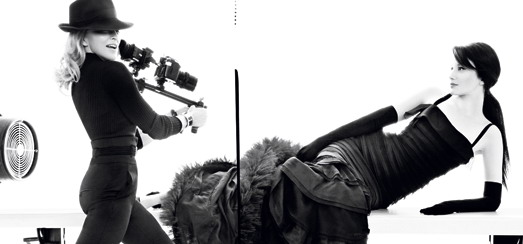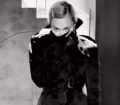
After posting the full interview, Harper’s Bazaar posted an extended Q&A a few days later…
On W.E.:
When I was really investigating the story of Wallis and Edward, I was struck by the idea that a man would walk away from something that is so symbolic of power. Men are such power-seeking creatures and they usually kill people to get to the throne. And here’s a man who decides one day that he’s going to leave the throne for love. Men usually say ‘Okay, I’m taking this job and you’re coming with me and you support me and that’s what I need’. So there’s one layer where you can look at it and go, ‘Oh my god, that’s so romantic, what a great sacrifice.’ I thought it was also very courageous of him because surely he understood the criticism that he was going to be exposed to. There’s just so many layers. Why would he walk away from this? Why couldn’t he have found another way to make the situation work? Why didn’t he see what the future was going to hold for him? Because if you just look at it on a surface level, you go ‘Oh god he’s weak. He’s a weak person’. But I looked at it and I turned the page said, ‘Actually what a brave thing to do.’ I saw Edward as very punk rock.
On art:
I’m attracted to artists like Frida Kahlo, because her work was her life, her questions, her outrage, her suffering, her pain. Everything is in her work. It was all a self-portrait, but that doesn’t mean that everything that has to be taken literally. Really, it’s one of my big pet peeves in life, that everybody takes everything literally, whether it’s the Bible or a work of art or literature or a human being. You can’t take anything literally. And I was very influenced by Anne Sexton. Because of her sassiness, she was a provocateur. She was a housewife who was married with children in the Fifties, repressed, but decided to go to school and become a writer against her husband’s wishes. Even her own teachers were telling her to stop writing such personal stuff. And she did it anyway. I loved her—I felt a kinship with her desire to break out of oppression and her search for somebody to connect with.
On starting out:
When I really started to take dancing seriously and saw myself as being a professional dancer, I decided to move to New York and leave that very provincial way of thinking in the Midwest behind. I wanted to go to New York, where all the eccentric, artistic people lived. At the time, my ballet teacher, who was a flamboyantly gay man, was really the first person in my life to encourage me to be different; to encourage me to follow my dreams. He was really the first one that said, “Get out of here. And you are special and you have something. Go follow your dreams.” And everybody needs that.
On gossip:
People get energy from it: it’s like a hit, like taking a drug. People like it when others are gossiping. When you hear a story about someone’s demise or some big faux-pas they made, everyone wants to tune into it, because it’s nice to know that someone else made a mistake. It makes you feel elevated for a moment. So I educate my children about that human trait we have that isn’t very attractive. I let them know that it’s going to happen to me, and possibly to them by default. But it goes into the folder of examination. It provokes many discussions about what’s real and what isn’t, about the society we live in.
On family:
Lourdes has her group of friends and she spends time with her father, who she adores [Madonna’s ex, Carlos Leon). He also lives in the city, and they take the subway together. She calls it “my normal life,” and I know that she enjoys it. She likes going to her abuela’s house—they still live in the same apartment that her father grew up in on the Upper West Side, a one-bedroom apartment. And they are really simple, humble people, and I’m so happy that she has that. My son, Rocco, is really into break-dancing. He has a crew that he dances with, and they’re kids from all over the city, Brooklyn, Queens. And my two youngest children are adopted from Malawi, and we discuss on a regular basis the orphanages they come from and the other children who didn’t get adopted, who might still be in the orphanages, or don’t even have an orphanage. We talk about the disparity in lifestyles and we all go back there. I’m doing my best to keep them grounded.
Also, read the full article by Naomi Wolf.
Madame X is available in Box Set, CD, Vinyl and Cassette!
Get your copy HERE!





